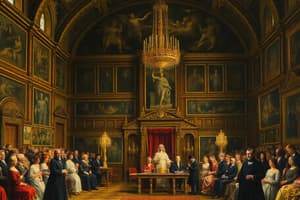Podcast
Questions and Answers
What is the primary role of Life Peers in the House of Lords?
What is the primary role of Life Peers in the House of Lords?
- To provide religious guidance
- To represent specific geographical areas
- To contribute expertise and experience to public life (correct)
- To inherit titles through descent
How many hereditary peers remain in the House of Lords following the reforms of 1999?
How many hereditary peers remain in the House of Lords following the reforms of 1999?
- 50
- 92 (correct)
- 200
- 120
Who primarily appoints Life Peers in the House of Lords?
Who primarily appoints Life Peers in the House of Lords?
- The Prime Minister on advice (correct)
- The House of Commons
- The Monarch directly
- Election by existing peers
What is the focus of the Public Accounts Committee?
What is the focus of the Public Accounts Committee?
Which type of committee consists of members from both the Commons and the Lords?
Which type of committee consists of members from both the Commons and the Lords?
Which category of Lords is appointed for their lifetime and typically has expertise in public life?
Which category of Lords is appointed for their lifetime and typically has expertise in public life?
The House of Lords consists solely of elected members.
The House of Lords consists solely of elected members.
Name one responsibility of Parliamentary Committees.
Name one responsibility of Parliamentary Committees.
The __________ consist of bishops from the Church of England who sit in the House of Lords.
The __________ consist of bishops from the Church of England who sit in the House of Lords.
Match the following types of Lords with their descriptions:
Match the following types of Lords with their descriptions:
Flashcards
Life Peers
Life Peers
Appointed for life by the Monarch on the advice of the Prime Minister, but primarily selected by the Prime Minister for their experience or public contributions. They make up the majority of the House of Lords.
Hereditary Peers
Hereditary Peers
Inherit their titles (like a duke or baron) and have seats in the House of Lords. These positions are passed on to a designated successor, usually the oldest son.
Lords Spiritual
Lords Spiritual
The 26 bishops of the Church of England who sit in the House of Lords, representing the Church's interests in Parliament.
Parliamentary Committees
Parliamentary Committees
Signup and view all the flashcards
Joint Committees
Joint Committees
Signup and view all the flashcards
What is the House of Lords?
What is the House of Lords?
Signup and view all the flashcards
Who are Life Peers?
Who are Life Peers?
Signup and view all the flashcards
What are Hereditary Peers?
What are Hereditary Peers?
Signup and view all the flashcards
Who are the Lords Spiritual?
Who are the Lords Spiritual?
Signup and view all the flashcards
What are Parliamentary Committees?
What are Parliamentary Committees?
Signup and view all the flashcards
Study Notes
The House of Lords
- The unelected upper house of Parliament
- Members are known as Lords or Peers
- Divided into categories:
Life Peers
- Appointed for life by the monarch, usually on the Prime Minister's advice
- Primarily appointed for expertise, experience, or public contributions
Hereditary Peers
- Inherit their titles
- Following reforms in 1999, only 92 remain
- These remaining peers are elected by other hereditary peers
Lords Spiritual
- 26 bishops of the Church of England
- Also known as "Lords Spiritual"
- Sit in the House of Lords
Parliamentary Committees
-
Crucial for scrutinizing and creating legislation
-
Examples include Public Bill Committees
-
Committees examine bills in detail and provide recommendations and amendments
-
Many different types of committees exist
-
Committees often organized by government departments (e.g., Treasury, Foreign Affairs)
-
Investigate specific policy areas
-
Committees scrutinize government departments/policy areas
-
Public Accounts Committee: Examines public spending, ensuring funds are used efficiently
- Only exists in the House of Commons
-
Joint Committees: Consist of members from both the House of Commons and the House of Lords; conduct inquiries into specific policy areas or issues
-
Vital for scrutiny and legislation formation
Studying That Suits You
Use AI to generate personalized quizzes and flashcards to suit your learning preferences.




